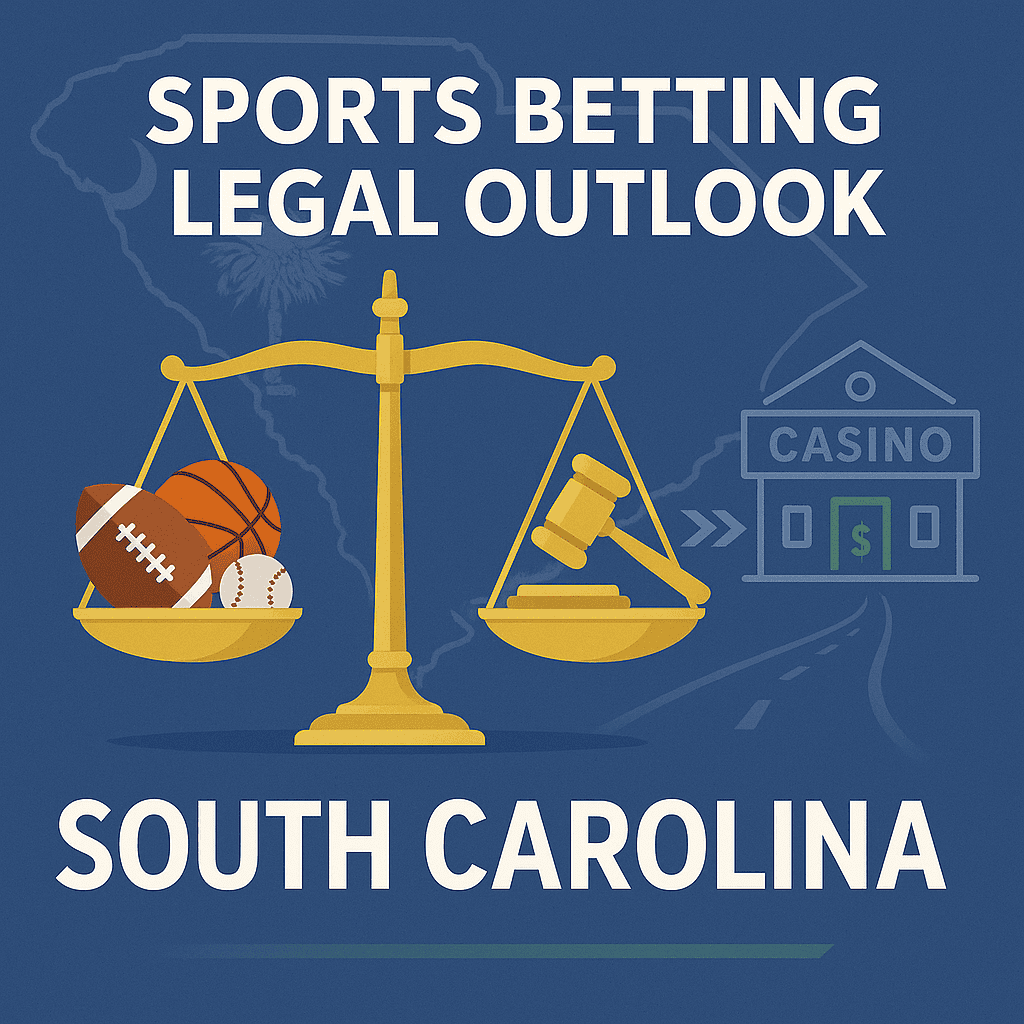South Carolina Sports Betting Legislation (2026 Outlook & Legal Analysis)
-
Martin Green
- January 10, 2026
South Carolina Sports Betting Legislation: 2026 Overview
South Carolina remains one of the few U.S. states where sports betting is still fully illegal, both online and in-person. Unlike many neighboring Southern states, South Carolina faces unique constitutional, political, and cultural barriers that have slowed any path toward legalization.
As of 2026:
- No state-regulated sportsbook apps operate in South Carolina
- No retail sportsbooks are permitted
- Any legalization effort requires a constitutional amendment, not just a statutory bill
This page breaks down why South Carolina hasn’t legalized sports betting, what’s currently happening in the legislature, and the realistic outlook for 2026 and beyond.
Why South Carolina Still Hasn’t Legalized Sports Betting
South Carolina’s resistance to sports betting is not due to lack of awareness—it’s structural.
- Constitutional Amendment Requirement
Unlike many states, South Carolina cannot legalize sports betting through a simple statute.
To legalize sports betting, the state must:
- Pass a proposed constitutional amendment with a two-thirds vote in both legislative chambers
- Secure majority approval from voters statewide in a general election
This is one of the highest legal thresholds in the country and makes rapid progress unlikely.
- Strong Conservative Opposition
South Carolina’s political landscape remains heavily conservative, particularly in rural districts.
Common objections include:
- Moral opposition to gambling expansion
- Concerns about addiction and social costs
- Resistance to expanding government oversight of gaming
This opposition has consistently stalled sportsbook-related bills before reaching the floor.
- Low Legislative Priority
Even among lawmakers who are open to legalization, sports betting is rarely a top issue.
Legislative focus in South Carolina remains centered on:
- Education funding
- Tax reform
- Infrastructure and transportation
- Public safety and healthcare
Sports betting reform often gets deferred to “study committees” rather than fast-tracked votes.
South Carolina Sports Betting: Historical Context
South Carolina has historically taken a restrictive stance on gambling.
Key points:
- The state bans commercial casinos
- Video poker was outlawed in the early 2000s
- Gambling exceptions are narrow (e.g., lottery, charitable bingo)
This background explains why sports betting legalization has moved far slower than in states like Tennessee or North Carolina.
South Carolina Sports Betting 2026 Outlook
Earliest Realistic Timeline
The earliest plausible path for legalized sports betting in South Carolina is a 2026 ballot initiative, assuming lawmakers act early in the session.
Even in a best-case scenario:
- 2026 would be a vote year, not a launch year
- Actual sportsbooks would likely not operate until 2027 or later
🗳️ 2026 South Carolina Sports Betting Ballot Probability (BMR Projection)
Likelihood sports betting reaches the 2026 ballot:
→ 41% (Uncertain)
Likelihood voters approve sports betting if on the ballot:
→ 58% (Moderately Favorable)
These projections are based on:
- Recent legislative discussions
- Public polling trends in the Southeast
- Shifts in party positioning
- Industry signaling and lobbying interest
2026 Support Scorecard: Who Supports Sports Betting in South Carolina?
Group | Position | Influence | Notes |
Pro sports stakeholders (Panthers region, SEC schools) | Mild Support | Medium | Favor betting growth across the Southeast |
South Carolina Lottery officials | Neutral | High | Open to a potential oversight role |
Democrats | Supportive | Medium | Often cite education funding |
Republicans | Mostly Opposed | High | Constitutional and moral concerns |
General public | Slightly supportive | Critical | Estimated ~50–52% support |
Current South Carolina Sports Betting Bills (2026)
S 327 – Sports Betting Study Bill
- Previously stalled in committee
- Intended to assess economic and regulatory impact
- Widely expected to re-emerge in some form during 2026
H 3783 – Constitutional Amendment Proposal
- Required for any 2026 ballot access
- Remains active for a future session
- Would allow voters to decide on legalization
Early Draft Frameworks
While no finalized framework exists yet:
- Informal drafts covering licensing and tax structure have circulated
- Most proposals assume online-only betting rather than casinos
- A lottery-led regulatory model is frequently discussed
Expert Prediction: Will South Carolina Legalize Sports Betting?
“If lawmakers unify early in 2026, South Carolina could finally move toward a 2026 ballot vote. The momentum is slow, but the long-term direction is trending toward eventual legalization.”
— Martin Green, BMR Editor-in-Chief
BMR’s assessment: legalization is more likely than not over the next decade, but South Carolina will remain a laggard compared to neighboring states.
If South Carolina Legalizes Sports Betting
If voters approve a constitutional amendment in 2026, a regulated market would likely launch in 2027 or 2028.
A typical rollout could include:
- 6–10 licensed online sportsbooks
- Oversight by the South Carolina Education Lottery
- Tax revenue directed toward:
- Education
- Infrastructure
- Public services
- Potential approval of in-stadium betting kiosks at major venues
Retail casinos are unlikely under current proposals.
What South Carolina Bettors Do Today
Because sports betting remains illegal in-state, many South Carolina residents choose to use international sportsbook platforms that accept SC players.
These platforms:
- Operate outside U.S. regulation
- Do not offer the same consumer protections as state-licensed apps
- Are discussed on BMR for comparison and educational purposes only
See our responsible gambling resources page.
FAQs: South Carolina Sports Betting Legislation
Is sports betting legal in South Carolina?
No. South Carolina has not legalized sports betting in any form as of 2026.
Why does South Carolina require a constitutional amendment?
The state constitution broadly prohibits gambling expansion. Sports betting legalization requires voter approval through an amendment.
Could sports betting appear on the 2026 ballot?
Yes, but only if lawmakers pass a constitutional amendment proposal with a two-thirds majority in both chambers.
If voters approve sports betting, when would apps launch?
Most likely in 2027 or 2028, depending on regulatory speed.
Would South Carolina allow online sportsbooks?
Most proposals focus on online-only betting, potentially overseen by the state lottery.
Does South Carolina border legal sports betting states?
Yes. Several neighboring states have legalized or are moving toward legalization, increasing regional pressure.






